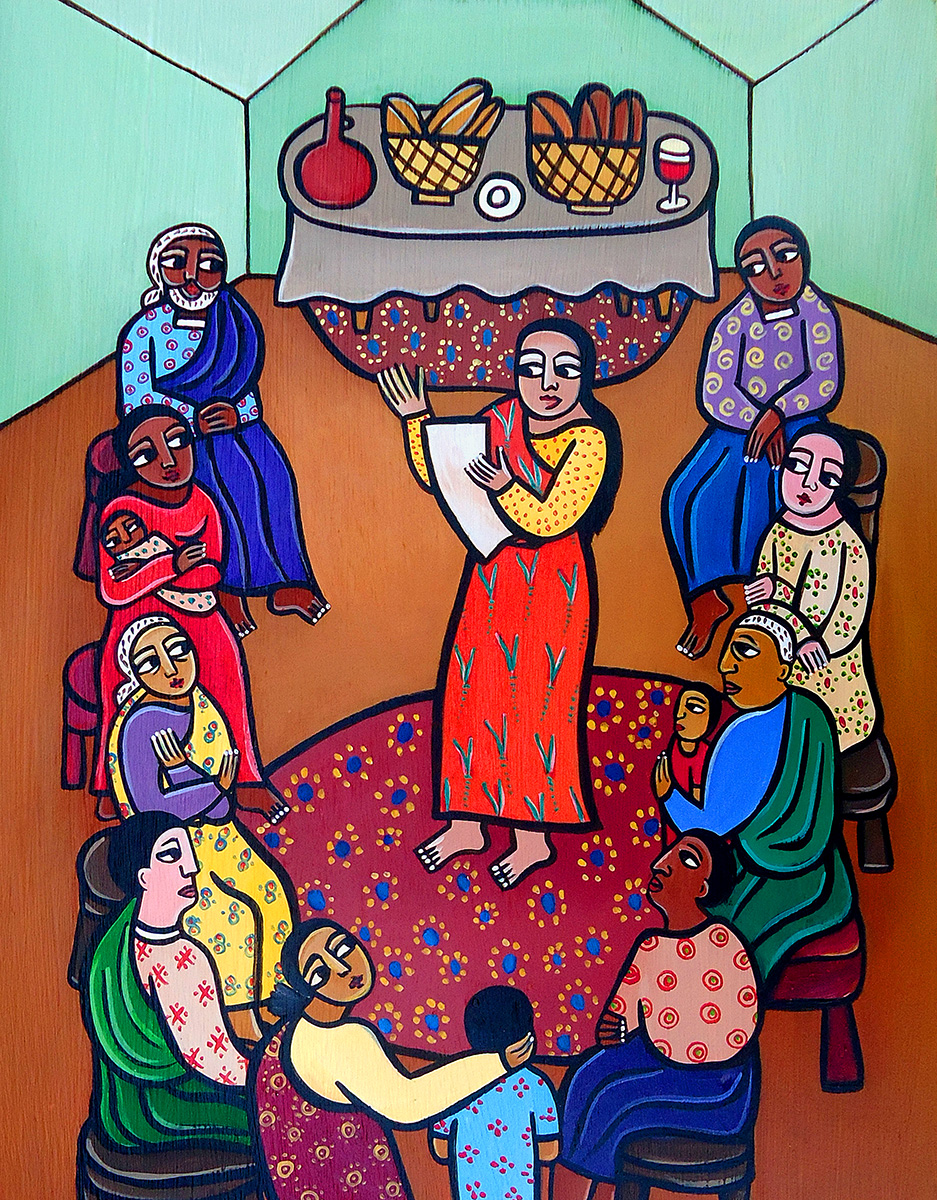- All
- Wisdom
- We Stand on Their Shoulders
- Vocation
- Uncategorized
- Stories Seldom Heard
- Spirituality
- Social Justice
- Prayer
- Peace
- Oneness
- Love
- Letting Go
- Lent
- Joy
- Inspirational Images
- Hope / Healing
- Holy Week
- Gratefulness
- God's Presence
- General News Stories
- Forgiveness
- Finding God
- Faith
- Easter
- Dominican Saints
- Discipleship
- Courage
- Christmas
- Catholic Sisters Week
- Care of the Earth
- Blessing
- Beauty
- Advent
- #justiceOPportunity
The Feast Day of Phoebe
Sr. Patricia Bruno, OP

September 3, 2023
289th Edition
The Feast Day of Phoebe
 The first epistle after the Acts of the Apostles is Paul’s “Letter to the Romans.” This letter was written around 57 CE. Contrary to the way I would have ordered the epistles in the Bible, either in alphabetical order or according to the dates they were written, the Bible places the epistles in order of their length. The longer epistles come before the shorter ones.
The first epistle after the Acts of the Apostles is Paul’s “Letter to the Romans.” This letter was written around 57 CE. Contrary to the way I would have ordered the epistles in the Bible, either in alphabetical order or according to the dates they were written, the Bible places the epistles in order of their length. The longer epistles come before the shorter ones.
In the “Letter to the Romans” it is obvious that Paul is not known to the Christians in Rome. Therefore, he needs to introduce himself by relying on his relationships with those who have credibility and authority. “I commend to you our sister Phoebe, a deaconess of the church at Cenchreae” (Rom. 16:1). (2)
Who is Phoebe? Most scholars believe that Paul gave the letter to Phoebe to be read publicly when the community gathered for the “breaking of the bread.”
Paul is no dummy when it comes to politics, he knows he needs to have a well-respected and trusted member of the Christian community deliver his letter.
Phoebe is obviously a well-known Christian. Her reputation for hospitality is indisputable. We hear it in Paul’s commendation. “She (Phoebe) has looked after a great many people, myself included.” Phoebe must have been a woman of means to have a residence to host frequent guests who requested hospitality. This gives us an insight into the first century that we often take for granted today. There were no motels in which people could stay. People usually stayed with friends. Within the Christian communities, certain homes were “known” to be open to travelers. Paul, in his letters, often speaks of the hospitality that he has received as he preaches the Gospel in different places. The gift of hospitality, then and now, should never be underestimated. It is one of the signs of a Christian community.
Phoebe was not just a woman of means. She was Paul’s “sister” or co-worker. She, like Paul, had dedicated her life to proclaiming the Word. Without her influence and ministry, the church in Corinth would not have been as strong and vibrant. Phoebe was a leader in her local church, a “deaconess.” This description of Phoebe has, of course, caused much discussion in recent years. Some people have described her activities as visiting the sick or other informal church ministries which the word “deacon or deaconess” can connote. But the word “deaconess” (deacon) is the same word Paul uses to describe himself and others who minister in the church. In the original Greek, there is no gender distinction. (2) Paul commends Timothy as “our brother and God’s deacon/servant” (I Thess. 3:2). Paul, also, says that Tychicus is “our beloved brother and faithful deacon” (Col 4:7).
Another insight we gain from Paul’s very brief comments about Phoebe is that she was not a “stay-at-home” Christian. She was out and about. She traveled and was fully engaged with the other Christian communities in different geographic areas. Then, as well as now, she would be called an itinerant preacher. Paul points out that she is eager to spread the Good News of the Gospel. It has been suggested that Phoebe was a missionary. That is why she was entrusted with Paul’s letter since she was traveling to Rome. It is clear that Paul wants the community in Rome to know just how important Phoebe is in the leadership of the church in Corinth.
There is a lot we will never know about Phoebe, but there is also much we can glean from Paul’s two short sentences about her. Phoebe is generous and influential. She is a woman of means, a deaconess of the church, and Paul’s co-worker. Paul’s affection for Phoebe cannot be hidden. Even though he says only a few words about her, it would be hard to find a more reliable and respected person to be the bearer of his letter to the Romans.
Well, what does all this mean to us? I would like to suggest that you reread Chapter 16 of Paul’s “Letter to the Romans.” Let your imagination run free. Spend time reflecting on Phoebe’s story. What would it be like to be a member of Phoebe’s faith community? Do you know women who have Phoebe’s leadership qualities, both spiritual and personal, who could be official leaders in the church? If so, who are these women?
I would also suggest that you read some of the information concerning Phoebe and her feast day. It is significant especially in our lives today as we continue to participate and pray with the Synod on Synodality. The Spirit is asking some significant questions.
Foot notes
1. The name Phoebe means “radiant.” Her feast day in both the Eastern and Western Catholic Church is September 3 (though it is on October 25 in the Lutheran Church). ● In 1969, the feast of Pope Gregory the Great (590-604 CE) was moved from March 12 to September 3, the anniversary of his election as pope, thus displacing Phoebe in liturgical celebrations. ● The Roman Martyrology, the official Catholic list of saints, 2004 edition, calls her ancilla Domini (handmaid of the Lord) among the faithful of Cenchreae.
2. Cenchreae was a port of Corinth. Most people think that Paul was in Corinth when he wrote this letter.
3. The Women’s Bible Commentary, ed. Carol Newsom and Sharon H. Ringe, SPCK, London, Westminster/John Know Press, Louisville, Kentucky, 1992. P. 314. Women is Scripture, ed. Carol Meyers, William B. Eerdmans Publishing Company, Grand Rapids, Michigan/Cambridge, U.K. 2000.p 135
I believe that the world was created and approved by love, that it subsists, coheres, and endures by love, and that, insofar as it is redeemable, it can be redeemed
Read More